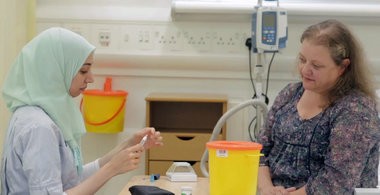We are committed to delivering cutting-edge basic, clinical, and applied research in metabolic diseases, that translates to reduced health inequalities and improved health outcomes for all.
Our research programme focuses on all elements of diabetes, endocrinology and obesity, from prevention through to treatments and cure.
Our partnership has resulted in a portfolio of basic science, clinical and applied research opportunities.
Our strengths include, type 1 diabetes, metabolic disturbance and major mental illness, gut pathophysiology, and interventions for obesity, and islet biology and beta cell therapy.
We have pioneered new treatments, published numerous research papers and are a leading centre for islet transplants, which involves extracting islet cells from the pancreas of a deceased donor and implanting them in the liver of someone with type 1 diabetes.
We have an exemplary academic record. 26% of our papers submitted to the Research Excellence Framework were rated ‘world-leading’ and 74% ‘internationally excellent'. We are looking to establish ourselves as a major UK centre for diabetes and obesity research.
Research achievements
Our achievements include:
- One of the first effective medication treatments for obesity shown through the trial of semaglutide medication.
- Gained a better understanding of the role of fluoxetine (a type of antidepressant) in the regulation of beta-cell mass and function.
- Conducting HARPdoc, a study which aims to find an effective way to help people with type 1 diabetes reduce their risk of hypoglycaemia.
- Conducting ASK study, an online survey which aims to correlate weight stigma and attitudes towards treatments for obesity.
- Running STEADY, a five-year study which aims to develop a complex intervention for people with type 1 diabetes and disordered eating.
Ambition
We will focus on:
- Launching a new academic research strategy focused on the interplay between diabetes, obesity and related complications, particularly on cardiovascular health and metabolic liver disease. We will seek to understand what areas will have the biggest impact on population health.
- Leading a Europe-wide collaboration to give patients more of a voice on the care they receive and the healthcare systems they are part of. The Health Outcomes Observatory (H20) brings together 23 partners across Europe, including university hospitals, patient groups, academic institutions and industry partners, to collect patient outcomes and incorporate them into healthcare decision making.
- Developing new global collaborations, especially within the TransCampus Initiative between Technische Universitat Dresden and King’s College London, to gain a greater understanding of the relationship between diabetes, pre-diabetes and other diabetic complications, support cutting-edge interdisciplinary training and address the role of COVID-19 on new onset and progression of diabetes.
- Developing our clinical and academic infrastructure to enhance cross-department and faculty collaborations, creating clinical/research fellowships, and exploring opportunities for co-location and increased capacity for wet labs (a type of lab where various types of chemicals and potential "wet" hazards or biological matter can be handled) and clinical trials.
- Working with industry partners to drive growth and collaborative development of a world-class metabolic disease and obesity research programme with links to metabolic liver disease and behavioural change.





